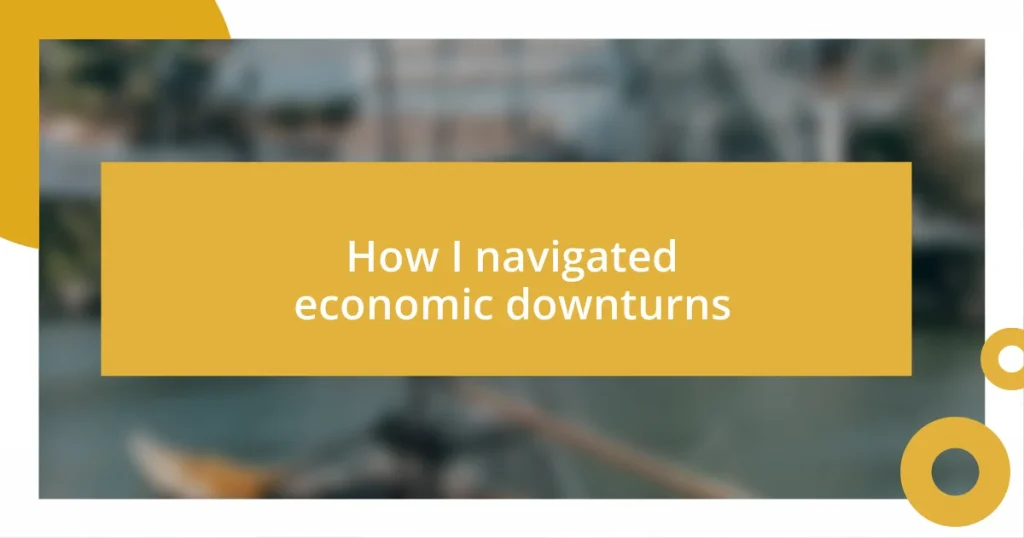Key takeaways:
- Emotional resilience is essential during economic downturns; processing fear and anxiety can lead to personal growth and clarity.
- Identifying early signs of recession, such as shifts in consumer behavior and stock market trends, can help prepare both mentally and financially.
- Building a solid long-term financial plan involves realistic goal-setting, regular assessment, and adaptability to changing circumstances.

Understanding economic downturns impact
Economic downturns can ripple through every facet of our lives, leaving a profound impact on both personal finances and emotional well-being. I remember a time when my small business experienced a significant dip in sales; it felt like the ground was shifting beneath my feet. How do we prepare emotionally when our financial stability is shaken to its core?
During these challenging periods, the uncertainty can feel overwhelming. I vividly recall the anxiety that came with not knowing if I could cover my bills or support my family. In such moments, it’s crucial to acknowledge that fear is a natural reaction; we must find ways to process those emotions rather than suppress them.
Moreover, downturns can bring about a shift in perspective. I found clarity in reevaluating my priorities and strategies—what was essential and what could be adjusted. I began to ask myself, “What lessons can I learn from this experience?” Embracing this mindset not only eased my stress but also helped me emerge stronger and more resilient in the long run.

Identifying early signs of recession
Identifying early signs of a recession can be like spotting storm clouds on the horizon. I remember a time when I noticed a decline in customer inquiries, which initially seemed insignificant. However, it became a clear indicator of shifting economic conditions—it made me realize that even subtle changes in consumer behavior can serve as a warning.
Another crucial sign I observed was an increase in job cuts and layoffs. A friend of mine who worked in a tech company shared stories of colleagues being let go. Hearing firsthand accounts of friends facing job insecurity created a real sense of urgency for me to reassess my financial situation and strategies. It highlighted the interconnectedness of the economy; one industry’s downturn can lead to ripple effects in others.
In addition to these indicators, watching for declining stock market trends can also be helpful. I recall the uneasy feeling I got whenever the financial news showed a significant drop in index values. This wasn’t just another number on a screen; it felt personal, as if it could affect my savings and plans for the future. By learning to read these signs early on, I was able to prepare myself mentally and financially for potential challenges ahead.
| Early Signs | Indicators |
|---|---|
| Consumer Behavior Changes | Decline in inquiries or sales |
| Job Cuts | Layoffs within industries |
| Stock Market Trends | Significant declines in index values |

Strategies for personal finance management
Managing personal finances during an economic downturn is often about making deliberate choices. I remember cutting back on non-essential expenses and reassessing my budget line by line. Those small changes, while uncomfortable at times, gave me a sense of control amid financial chaos. Prioritizing necessities over luxuries became my mantra.
Here are some strategies that I found effective:
- Create a Realistic Budget: Track every expense to understand where your money is going.
- Build an Emergency Fund: Aim for three to six months’ worth of living expenses to cushion unexpected financial shocks.
- Reduce Debt: Focus on paying down high-interest debts first; lessening this burden can relieve stress.
- Explore Additional Income Sources: I started freelancing on the side, which not only supplemented my income but also opened new opportunities.
- Invest Wisely: Even during downturns, I learned to look for undervalued assets that could appreciate over time.
Every small step can contribute to a more secure financial position, enabling you to weather the storm when challenges arise.

Diversifying income during downturns
Diversifying income during downturns became a lifeline for me when the economic climate shifted. I remember when my main source of income took a hit; suddenly, I was scrambling to find ways to stay afloat. That’s when I discovered the power of gig work. By taking on freelance projects, I not only cushioned my financial situation but also tapped into skills I didn’t know I had. Does anyone else out there feel that spark of excitement when you step into something new? It can be surprisingly fulfilling.
During one intense downturn, I turned my love for crafting into a small online business. Each sale didn’t just bring in extra cash; it reignited my passion and creativity amid uncertainty. It’s incredible how diversifying your income can provide not just financial stability, but also emotional resilience. I found myself asking, “What else can I do?” and the more I explored, the more opportunities unfolded.
I also connected with others in my network to create additional income streams. Collaborating on projects or even sharing resources with friends helped spread the risk. I still remember a brainstorming session where different ideas flowed, and it felt like a team effort, rather than a solo battle. If you’re in a similar place, why not gather some like-minded folks and brainstorm your way to new opportunities? You never know what might flourish from a simple conversation!

Investing wisely in uncertain times
Investing wisely in uncertain times requires a unique mindset. I remember the anxiety I felt during the stock market plunge; everyone around me seemed to panic. Instead of following the herd, I took a deep breath and focused on solid fundamentals. I revisited my investment strategy, seeking out companies with strong balance sheets and sustainable business models. This approach not only calmed my nerves but also positioned me for potential growth when the dust settled.
When uncertainty looms, I find that diversification is crucial. During a particularly tough economic period, I diversified my portfolio by exploring sectors that tend to perform well even in downturns, such as utilities and consumer staples. It was reassuring to see that, despite the overall market volatility, some investments remained stable. I often ask myself: “Which sectors can weather the storm?” That question guided my decisions and helped me think long-term instead of focusing purely on short-term fluctuations.
Moreover, I learned that dollar-cost averaging can be a useful tactic during these times. I set up regular contributions to my investments, regardless of the market conditions. I recall the sense of empowerment it gave me—knowing I was steadily building my wealth rather than waiting for the perfect moment. Isn’t it refreshing to realize that consistent effort often trumps timing the market? It’s about resilience and patience, reminding us that investing isn’t just a sprint; it’s a marathon.

Maintaining mental health and resilience
Maintaining mental health and resilience during economic downturns is crucial. I vividly remember a phase when the weight of anxiety felt overwhelming. I decided to prioritize my mental well-being by establishing a daily routine, incorporating mindfulness practices like meditation and journaling. These small but impactful changes became my anchor, helping me navigate through the stormy seas of uncertainty without losing my balance.
Another aspect that really stood out for me was the importance of connection. In moments of stress, I often reached out to friends and family, sharing my thoughts and feelings. I realized how comforting it is to communicate with others about shared worries and anxieties. Have you ever felt that sense of relief when someone else understands your struggle? Finding a support system during tough times not only offers perspective but also fosters a sense of belonging that can greatly enhance resilience.
I also learned that prioritizing self-care activities, like reading or engaging in hobbies, served as an important outlet. I remember diving into books that inspired me or even taking long walks to clear my mind. What I found was that these simple pleasures provided me with a mental breather, allowing me to reset and approach challenges with renewed energy and creativity. It’s fascinating how these moments of self-care can transform our mindset and foster a more resilient approach to life’s challenges.

Building a long-term financial plan
Building a long-term financial plan is about laying a strong foundation that will weather economic storms. I remember sitting down one evening with a cup of tea, contemplating my financial future. It struck me that having a clear budget was essential. I crafted a document that outlined my income, expenses, and savings goals. Seeing everything organized in one place provided me with a sense of control, and I often remind myself: how can you plan for tomorrow if you aren’t clear on where you stand today?
As I refined my long-term financial strategy, I discovered the importance of setting realistic goals. Initially, I wanted to reach an ambitious savings target within a year, but I soon realized that pacing myself was key. By breaking down my larger goals into smaller, achievable milestones, I stayed motivated and felt a sense of accomplishment along the way. Has there ever been a time when you overwhelmed yourself with lofty expectations? Learning to appreciate the journey of saving rather than just the destination made all the difference for me.
Additionally, I found that revisiting and adjusting my financial plan was vital. Life changes and market fluctuations meant that my initial strategy needed tweaks over time. I remember when I took a weekend to review my investment allocations and found opportunities I hadn’t considered before. It’s fascinating how regularly assessing your finances can reveal new pathways. I often think: “Am I still on track, or have my circumstances shifted?” Answering that question has guided me toward making informed decisions, ensuring my plan remains aligned with my evolving goals.














